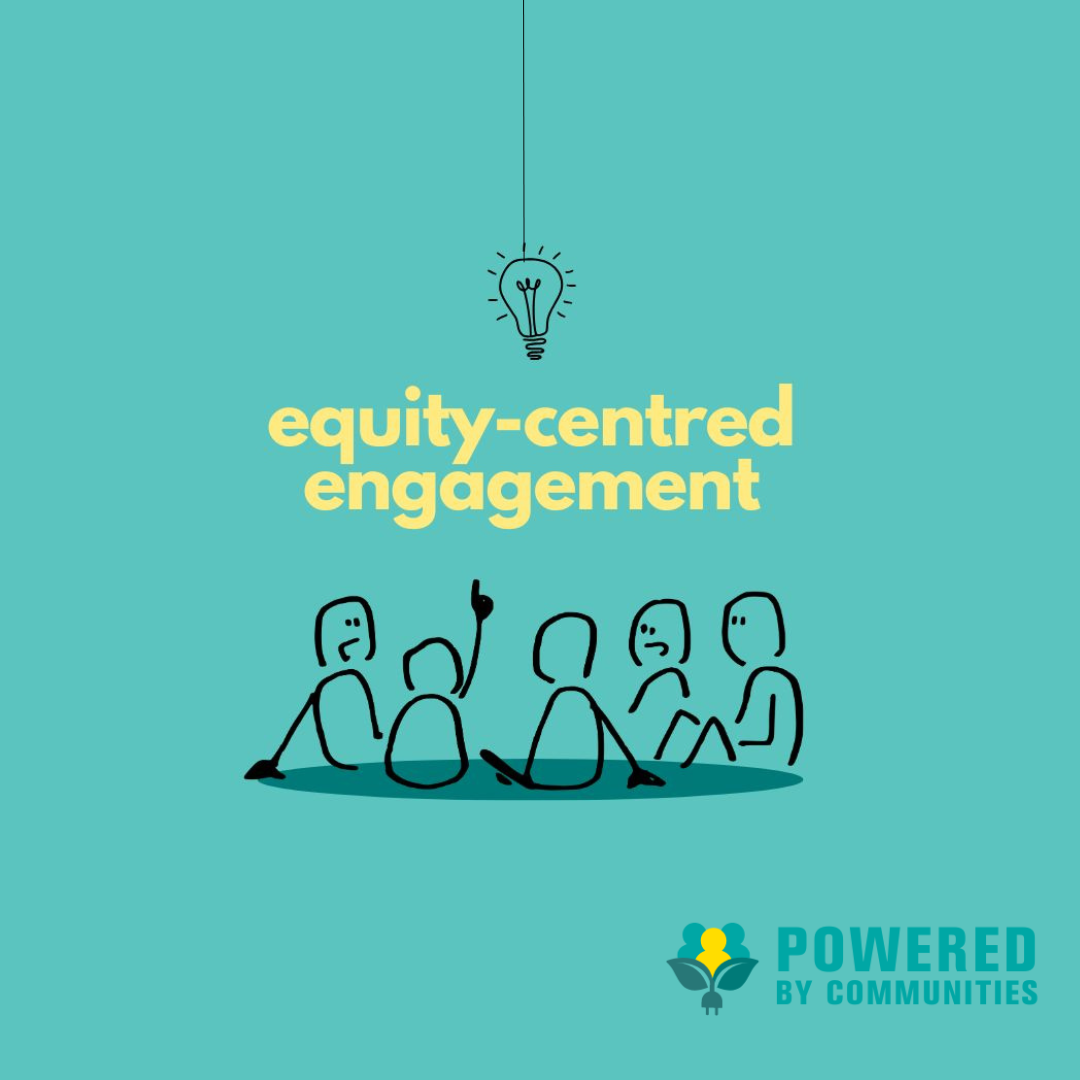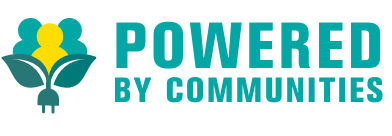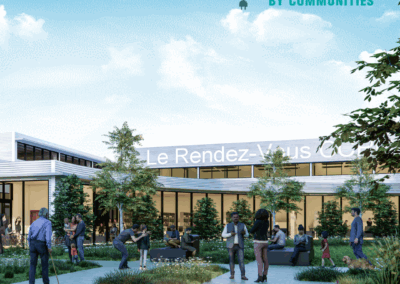Equity-centred engagement and community energy and emissions planning
By Aaliyah Lahai, Junior Lead, QUEST Canada
The Spider Stories from my Liberian culture tell a creation story where a spider carries a pot of wisdom. One day, the pot slips from its grasp, spilling its contents and bringing forth the world as we know it. The story imparts a foundational understanding: within every creature and system lies the teachings from this pot, underscoring the interconnectedness of all things.
My grandmother often wove this lesson into her teachings about the significance of “here.” Not “here” as a specific place but as an understanding of and connection to the system in which one is situated. She would say that where your feet are, the problem may rest, but so too may the solution. This philosophy emphasizes grounding oneself in the present and recognizing the potential for transformation rooted in the basics of one’s immediate context. There’s power in place.
Reflecting on sustainability and my work on Community Energy and Emissions Plans (CEEPs) in New Brunswick has brought these teachings to life in the context of rural community engagement in energy planning. I have considered how these principles resonate deeply with equity-centred engagement and the tailoring of solutions to local contexts.
Inclusive decision-making
Equity-centred engagement — processes that foster inclusive decision-making by addressing the diverse needs, perspectives, and communities’ priorities — extends beyond ethics. It is a practical framework for co-creating impactful outcomes by embedding feedback loops and clear indicators that ensure accountability and adaptability. As social and economic systems are inherently tied to the environment, discussions around sustainability often surface systemic challenges across these domains.
Equity-centred engagement begins with recognizing community diversity — socioeconomic status, cultural backgrounds, gender identities, and lived experiences. Yet, it must go further. Meaningful engagement requires a deliberate approach that identifies and addresses systemic barriers while fostering collaboration and solutions specific to local contexts. This interplay of people and place — along with the social, environmental, and economic systems woven into their fabric — creates unique challenges and opportunities within each system.
By embracing this interconnected web, we can better understand and address the complexities of sustainability. This practice calls for humility, adaptability, and a commitment to equity as we work toward solutions that reflect the unique dynamics of the communities we serve.
Following the November 2023 local elections, the implementation of New Brunswick’s Local Governance saw the amalgamation of 104 local governments and 236 local service districts into 77 local governments and 12 rural districts. This significant restructuring effectively doubled the size and responsibilities of many municipalities almost overnight, creating new administrative frameworks and mandates. Among these is the provincial requirement for municipalities to establish a net-zero strategy, aligning with provincial and federal goals of achieving net-zero greenhouse gas (GHG) emissions by 2050.
Evolving context
In this evolving context, the Community Energy and Emissions Plans development workshop program plays a critical role in driving progress by aligning local priorities with these overarching goals. As facilitators, the QUEST team finds itself uniquely positioned at the intersection of early framework development and the practical challenges of implementation. While implementation often marks success, the pathway to achieving it — the actors involved, the systems enabling engagement, the feedback loops established during and after implementation, and, critically, the question of who is involved — is equally essential.

QUEST Canada’s CEEP workshops aim to equip municipalities with the tools to navigate these complexities effectively. However, the success of these efforts depends on fostering programs that are adaptable and promote meaningful engagement. These systems must account for the nuances of local contexts, prioritizing nature-based and community-specific solutions while addressing systemic social challenges embedded in energy and emissions frameworks.
Meaningful engagement in this context hinges on open dialogue, trust-building, and clear incentives for participation. By fostering enduring relationships and incorporating diverse perspectives, municipalities can create strategies that not only meet technical goals but also reflect the unique dynamics of their communities.
Currently QUEST CEEP workshop teams conduct the following to assist communities:
- Providing municipalities with a curated list of potential invitees to ensure diverse representation.
- Encouraging community-led promotion of events, while critically examining whether outreach strategies resonate with and include various demographics.
- Leveraging community hubs to facilitate intergenerational dialogue and input.
- Actively engaging key stakeholders like NB Power to ensure alignment and accountability.
However, from a New Brunswick perspective, QUEST members have observed that while presenting recommendations to communities, the unique characteristics of New Brunswick’s towns and rural areas often highlight the challenges of applying generalized frameworks. Many communities find themselves in a foundational phase of which some recommendations require previous strategic engagement efforts and social infrastructure.
The recent amalgamation of municipalities in New Brunswick underscores the need for open conversations and the cultivation of lasting relationships across governments, organizations, and communities with an opportunity to shape systems and structures that will guide sustainability efforts. The distinct realities of local contexts necessitate tailored frameworks that reflect each community’s specific needs and capacities.
Meeting people where they are
Effective engagement requires meeting people where they are — both physically and contextually. It involves identifying and utilizing spaces where individuals feel represented, included, and empowered, which may extend beyond traditional municipal buildings to community third spaces that resonate with local identities.
Accessibility is another critical consideration. The language used in sustainability discussions often overwhelm participants, particularly when technical jargon lacks clear and relatable explanations. Complex terminology, especially in energy-related contexts, can isolate groups and inadvertently reinforce social barriers like classism. Ensuring that communication is contextually relevant means asking communities how they would name and explain certain concepts. This not only enhances understanding but also respects the expertise of community members as historians, scientists, and stewards of their own lived experiences, deeply connected to place and its social, economic, and environmental systems.
From a policy perspective, workshops are often logistically structured with a focus on time constraints and deliverables, frequently overlooking the dynamic and nuanced nature of community engagement. Flexibility in structure and approach is essential for fostering trust and building genuine relationships. Long-term relationships, grounded in transparency and mutual respect, are critical to successful engagement. Importantly, this engagement must not be extractive — communities should clearly see how their input shapes outcomes, reinforcing the value of their contributions. However, limited funding and time pressures can result in tokenistic or superficial engagement efforts.
Investment in capacity-building
Genuine participation demands adequate investment in capacity-building and meaningful support for participants, ensuring they have the tools and resources to engage effectively. Equity is not merely a lens for viewing sustainability — it is the foundation for enduring and transformative change.
As the Spider Stories from my culture teach, wisdom resides within every creature and system. This grounding perspective highlights the importance of engaging communities as co-creators rather than passive participants. Co-design fosters ownership and ensures that solutions align with lived realities, while traditional consultation processes too often reinforce hierarchies that marginalize those most affected, undermining the authenticity of engagement efforts.
In the context of New Brunswick and QUEST Canada’s CEEP workshops, we’ve observed and are adjusting to the limitations of top-down approaches that fail to adequately integrate bottom-up, community-driven perspectives. Without practical frameworks co-developed alongside rural communities, a critical gap emerges between policy intent and on-the-ground implementation.
So the pressing question remains: How can policies better accommodate and support the co-creation of just energy transition frameworks that empower communities and drive meaningful action?
ABOUT THE AUTHOR

Aaliyah Lahai
Aaliyah holds a B. Sc. in Microbiology and Immunology, Sustainability, and a certificate in Environmental Impact Assessment from Dalhousie University. From a young age, the intersection of technology and environmental science has always fascinated her. This passion led her to pursue a career at the crossroads of climate justice and innovation. In the non-profit sector, Aaliyah has worked on several research projects and committees addressing community development through interdisciplinary collaboration, to reveal interwoven perspectives and experiences within the intersections of environmental, social and economic systems. She lives in Moncton, NB.

About Powered by Communities
Established in 2017, Powered by Communities is an awareness-raising, communications and media platform that highlights and celebrates local community energy initiatives taking place across the country, from coast to coast to coast. The platform inspires, informs and engages its readership with stories and articles detailing community energy initiatives being led by local governments, municipalities, Indigenous communities, community groups, non-profits, charities, and enterprising individuals.

About QUEST Canada
QUEST Canada is a registered Canadian charity that supports communities in Canada on their pathway to net-zero. Since 2007, we’ve been facilitating connections, empowering community champions and advising decision-makers to implement energy use and emissions reduction solutions that best meet community needs and maximize local opportunities. We develop tools and resources, convene stakeholders and rights holders, and advise decision-makers — all with the goal of encouraging, assisting and enabling communities to contribute to Canada’s net-zero goals.

Support local communities by sharing this story
MORE FROM POWERED BY COMMUNITIES
Sign Up
Join the Conversation!
Sign up to get the latest news and updates about QUEST Canada events and receive QUEST Canada's monthly newsletter.




